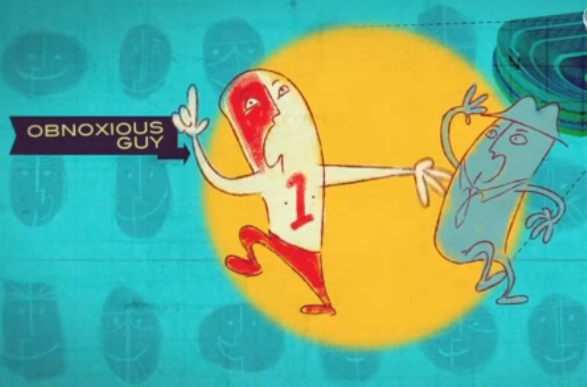(单词翻译:单击)
听力文本
Imagine you're at a football game when this obnoxious guy sits next to you.
想象你在一场足球赛中,这个讨厌鬼坐在你的旁边。
He's loud, he spills his drink on you, and he makes fun of your team.
他大吵大叫,把饮料溅到你身上,并且还嘲笑你支持的足球队。
Days later, you're walking in the park when suddenly it starts to pour rain.
几天之后,当你正在公园散步,突然下起大雨。
Who should show up at your side to offer you an umbrella?
此时谁会出现在你身边为你遮雨?
The same guy from the football game.
恰巧就是足球赛上你旁边的那个人。
Do you change your mind about him based on this second encounter,
此时你对他的看法会因为第二次相遇而改变,
or do you go with your first impression and write him off?
还是会坚持对他的第一印象继续讨厌他?

Research in social psychology suggests that we're quick to form lasting impressions of others based on their behaviors.
社会心理学专家认为我们会基于别人的行为作出永久的印象评价。
We manage to do this with little effort, inferring stable character traits from a single behavior,
我们为此无需付出太多努力,通过单一的行为作出对他人稳定性格的判断。
like a harsh word or a clumsy step.
比如一句伤人的话,或者笨拙的步伐。
Using our impressions as guides, we can accurately predict how people are going to behave in the future.
凭借主观印象,我们能准确预测他人将会发生的行为。
Armed with the knowledge the guy from the football game was a jerk the first time you met him,
由于把足球赛中第一次遇见的那个人定义为混蛋,
you might expect more of the same down the road.
你可能会预想他会做出更多混蛋事。
If so, you might choose to avoid him the next time you see him.
如果是这样,下次遇见的时候你可能会选择躲着他。
That said, we can change our impressions in light of new information.
基于这样的理论,通过新的信息我们可以改变自己的刻板印象。
Behavioral researchers have identified consistent patterns that seem to guide this process of impression updating.
行为研究者发现了引导印象更新过程的固定模式。
On one hand, learning very negative, highly immoral information about someone
一方面,对一个人的负面评价所带来的影响
typically has a stronger impact than learning very positive, highly moral information.
要高于对一个人的正面评价所带来的影响。
演讲视频


